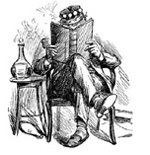
What Would Flannery O’Connor Say?
A CATHOLIC RESPONSE TO SAME-SEX ATTRACTION
Years ago, I was having coffee with some good friends, Catholic mothers just like me, and the conversation turned to our children and the toxic sexual culture in which they are soaking. One friend expressed her frustration that her daughter’s best friend had recently “come out” as a lesbian. I began to respond, “Well, Flannery O’Connor said…,” only to be interrupted, half comically, half seriously, by another friend. “Oh my God,” she said in mock frustration, “is there any conversation we can have without you relating it somehow to Flannery O’Connor?”
After puzzling over that comment for several years, I have finally concluded that no, there probably isn’t a contemporary conversation about love, faith, or morals that cannot be vastly enriched by asking, “What would Flannery say?” I can easily imagine my friend shooting back at me, “Why on earth should we care what a Southern Catholic writer who died in 1964 thought about same-sex attraction?” To provide an answer, I need to say something brief about the role Flannery O’Connor played in my own life.
My love affair with Flannery O’Connor began when I was in graduate school; it did not happen when I first read her fiction, which I found to be harsh, unfeeling, and strange. Evidently, I lacked a “Flannery O’Connor decoder ring.” Then someone lent me a copy of The Habit of Being (1988), a collection of Flannery’s letters, edited by Sally Fitzgerald, and — just like that! — my life was transformed. Flannery’s letters reveal a woman who is strong, sane, and eminently funny. Even more important to me back then, as a lukewarm and lazy Catholic with doubts about many Church teachings, she was a hardheaded, smart, and thoroughly orthodox Catholic. One cannot read her letters without coming to know a woman for whom the Church is no crutch, no weakness, but rather a source of enduring challenge and strength.
Many of Flannery’s wisest, funniest, and most touching letters were to a woman identified by Fitzgerald only as “A.” Not only was “A” not Catholic when she first wrote to Flannery, she was not even a theist. Flannery was immediately drawn to her, though, because she recognized a perceptive and witty reader who “got” what she was “up to” as a writer. At the beginning of their correspondence — a correspondence that lasted from 1955 to 1964 — “A” gave Flannery a good bit of grief about the Church, and in explaining her vision of Catholicism to this new friend, Flannery ensnared me as well as “A.” Her letters created in me a love for and understanding of my own faith.
You May Also Enjoy
Among the nations of the Old World only the Vatican raises her lonely voice against the enshrinement of immorality into law and as a result becomes the target of public scorn and ridicule.
The evidence is clear that our society will decompose, long before the human species dies out, when the traditional family is dethroned from its place of honor.
Is it possible to complain about the media’s hard sell of sex, sex, and more…

